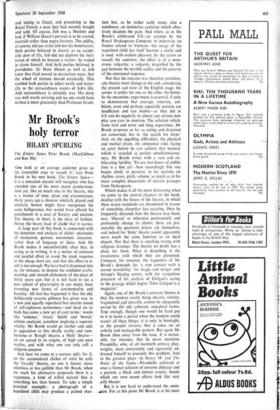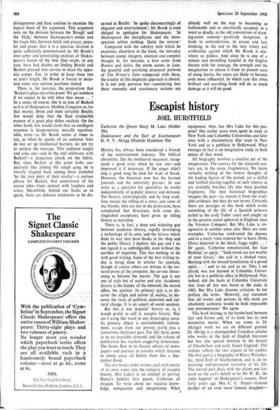Mr Brook's holy terror
HILARY SPURLING
`One look at an average audience gives us the irresistible urge to assault it,' says Peter Brook in his new book, The EMpty Space— it is a sensation anyone will recognise who has attended one of his most recent productions. And yet, like so much else in the theatre, this is a matter of time, place and circumstance; thirty years ago a director similarly placed and similarly honest might have recognised the same belligerence, but would have offered his punishment in a coat of flattery and unction. The theatre, in short, is the slave of fashion. Hence the heavy load of cliche that it carries.
A large part of this book is concerned with the detection and analysis of cliche—platitudes of intonation, gesture, movement, situation, rather than of language or ideas. And Mr Brook makes it uncomfortably clear that, in acting as in writing, it is a matter of constant and painful effort to avoid the stock response or the cheap short cut; and that this effort in it- self is not enough. We have had it drummed into us, for instance, to- despise the confident crafts- manship and smooth dishonesty of the plays of thirty years ago; but it is not hard to see a new school of playwrights in our midst, busy inventing new forms of sentimentality and banality. All that has happened is that the old, deliberately evasive glibness has given way to a new and equally superficial but smarter mood of self-righteous earnestness—and hard on its heels has come a new set of cant terms: words like `violence,' ritual,"belch' and 'bowel,' seldom analysed, somehow implying a superior vitality. Mr Brook would go further and add, in opposition to this ideally earthy and rum- bustious or `Rough' theatre, a 'Holy' theatre— an art sacred in its origins, of high and pure resolve, and with what one can only call a religious purpose.
And here we come to a curious split; for if, on the accumulated clichés of what he calls the 'Deadly' theatre, no one is fiercer, more relentless or less gullible than Mr Brook, when we reach his alternative proposals there is a vagueness, a kind of wilful naivete that is something less than honest. To take a simple practical example: a photograph of a napalmed child may produce a pained reac-
tion but, as he rather sadly notes, also a numbness, an instinctive cynicism which effec- tively deadens the pain. And when, as in Mr Brook's celebrated US—an attempt by the Royal Shakespeare Company to improvise on themes related to Vietnam—the image of the napalmed child has itself become a cliché and is used, with evident pleasure, by the actors to assault the audience, the effect is of a mon- strous vulgarity; a vulgarity magnified by the gap between the terrible reality and the poverty of the emotional response.
Not that the exercise was therefore pointless; any theatre must change or die and, considering the present sad state of the English stage, the sooner it settles for one or the other the better. In the meantime, experiment is essential, if only to demonstrate that courage, sincerity, am- bition, even and perhaps especially passion are insufficient and can misfire—as they did in US and do regularly in almost any serious new play you care to mention. The solution which, from trial and error and long experience, Mr Brook proposes so far as acting and direction are, concerned, lies in 'the search for form.'
And, ,the e appalling difficulties, the physical and mental strain, the emotional risks facing an. actor, before he can achieve that mastery which is revealed as perfect unselfconscious- ness, Mr Brook writes with a rare and ex- hilarating lucidity. 'To use two hours of public time is a fine art'—how exceedingly fine one begins dimly to perceive, in his sections on rhythm, stress,, pitch, volume, as much as in his more complex discussions of certain passages from Shakespeare.
Which makes it all the more distressing when we come to the central chapters of the book, dealing with the future of the theatre, in which these severe standards are abandoned in favour of something altogether less exacting. Here he frequently demands how the theatre may burn, sear, `liberate' or otherwise permanently and profoundly change its clients; these are pre- sumably the questions priests ask themselves, and indeed his `Holy' theatre would apparently serve much the same function as an ideal church. Not that there is anything wrong with religious, leanings. The theatre no doubt has a place for them. What is disturbing is the evasiveness with which they are presented. Compare, for instance, the vagueness of Mr Brook's demands for 'a true contact with a sacred invisibility,' for magic and danger and Artaud'i blazing centre, with the scrupulous precision of his analysis of Gielgud's acting in the passage which begins 'John Gielgud is a magician.'
Again, one of Mr Brook's constant themes is that the modern world, being chaotic, sinister, fragmented and unstable, cannot be adequately served by the old, coherent, anecdotal forms. Triie enough, though one would be hard put to it to name a period when the modern world wasn't all these 'things; it is only in hindsight, as the present retreats, that it takes on an orderly and manageable pattern. But again Mr Brook shies away from the issue. It is notice- able, for instance, that he never mentions Pirandello, who, of all twentieth century play- wrights, most consistently and rigorously ad- dressed himself to precisely this problem. And in his greatest plays—in Henry IV and The Rules of the Game—Pirandello achieved at once a formal solution of extreme delicacy and a passion, a bleak and sinister cruelty, beside which our own recent efforts look like very jolly bluster. But it is not hard to understand the omis- ..sion. For at this point Mr Brook is at his most
disingenuous and least anxious to examine the logical basis of his argument. This argument rests on the division between the 'Rough' and the 'Holy,' between Shakespeare's comic and his tragic bits, between belch and prayer, popu- lar and pious; that it is a spurious division is quite sufficiently demonstrated by Mr Brook's own sober and penetrating analyses of Shakes- peare's fusion of the two. One might, in any case, have had doubts on finding Brecht and Beckett pressed into service to head the oppo- site camps. For, in order to keep these two at arm's length, Mr Brook is forced to main- tain some very curious positions indeed.
There is, for instance, the proposition that 'Beckett's plays are critic-proof. We get nowhere if we expect to be told what they mean . . In a sense, of course, this is as true of Beckett as it is of Shakespeare, Mob6re, Congreve or, for that matter, Ibsen and most certainly Brecht; few would deny that the final irreducible essence of a great play defies analysis. On the other hand, few would claim that an intelligent response is inappropriate, morally reprehen- sible, even—as Mr Brook seems at times to say, as when he speaks of an audience 'who do not set up intellectual barriers, do not try to analyse the message. This audience laughs and cries out—and in the end celebrates with Beckett'—a dangerous attack on the fabric. But, since Beckett at this point looks sus- piciously like joining the rough gang, he is smartly slapped back, among those excluded `by the very piety of their resolve'—a curious phrase for Beckett, that connoisseur of the coarse joke—from contact with laughers and criers. Meanwhile, behind our backs so to speak, there are dubious tendencies to be dis- cerned in Brecht: 'he spoke disconcertingly of elegance and entertainment'; Mr Brook is even obliged to apologise for Shakespeare: 'In Shakespeare the metaphysics and the intro- spection soften nothing. Quite the reverse.'
Compared with the subtlety with which he examines, elsewhere in the book, the interplay between sound, imagery, emotion and complex thought in, for instance, a love scene from Romeo and Juliet, the storm scenes in Lear, the graceful and satisfying structural patterns of The Winter's Tale—compared with these, the crudity of this dogmatic approach is absurd. It is not only perverse but—considering that these romantic and reactionary notions are
already well on the way to becoming as fashionable and as uncritically accepted, in a word as deadly, as the old conventions of draw- ing-room comedy—positively dangerous. It leads to contradictions, to coarse and lazy thinking, in the end to the very falsity and artificiality against which Mr Brook is else- where so pitiless. And since he is one of a minute and dwindling handful in the English theatre with the courage, the strength and the imagination to release it from its present state of smug inertia, his views are likely to become even more influential. In which case this often brilliant and searching book will do as much damage as it will do good.











































 Previous page
Previous page